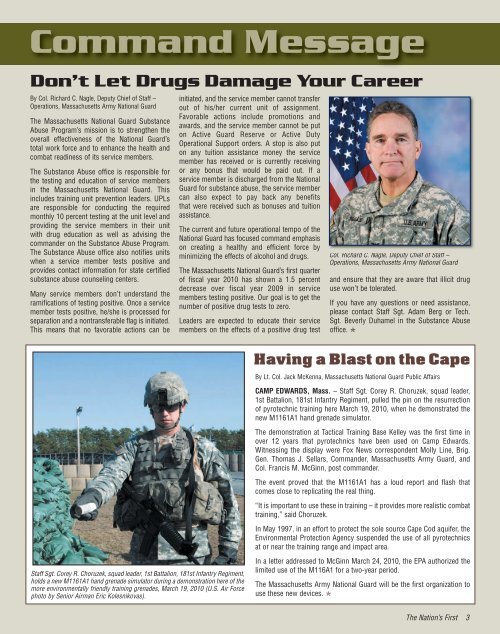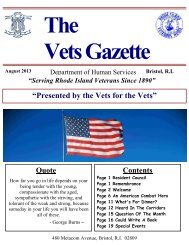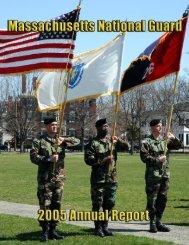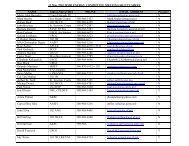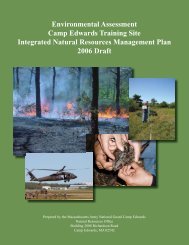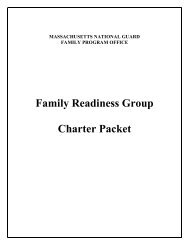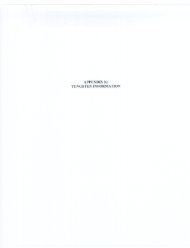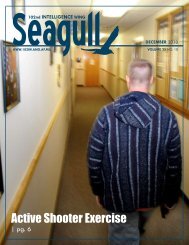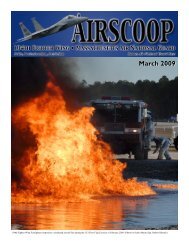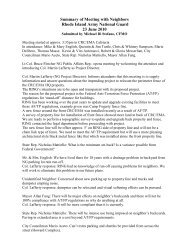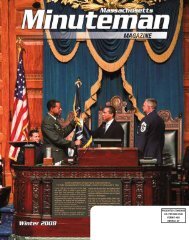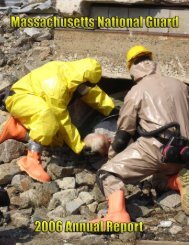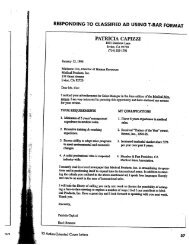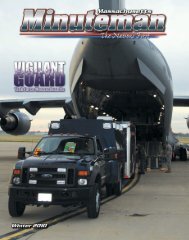Summer 2010 - STATES - The National Guard
Summer 2010 - STATES - The National Guard
Summer 2010 - STATES - The National Guard
You also want an ePaper? Increase the reach of your titles
YUMPU automatically turns print PDFs into web optimized ePapers that Google loves.
Command Message<br />
Don’t Let Drugs Damage Your Career<br />
By Col. Richard C. Nagle, Deputy Chief of Staff –<br />
Operations, Massachusetts Army <strong>National</strong> <strong>Guard</strong><br />
<strong>The</strong> Massachusetts <strong>National</strong> <strong>Guard</strong> Substance<br />
Abuse Program’s mission is to strengthen the<br />
overall effectiveness of the <strong>National</strong> <strong>Guard</strong>’s<br />
total work force and to enhance the health and<br />
combat readiness of its service members.<br />
<strong>The</strong> Substance Abuse office is responsible for<br />
the testing and education of service members<br />
in the Massachusetts <strong>National</strong> <strong>Guard</strong>. This<br />
includes training unit prevention leaders. UPLs<br />
are responsible for conducting the required<br />
monthly 10 percent testing at the unit level and<br />
providing the service members in their unit<br />
with drug education as well as advising the<br />
commander on the Substance Abuse Program.<br />
<strong>The</strong> Substance Abuse office also notifies units<br />
when a service member tests positive and<br />
provides contact information for state certified<br />
substance abuse counseling centers.<br />
Many service members don’t understand the<br />
ramifications of testing positive. Once a service<br />
member tests positive, he/she is processed for<br />
separation and a nontransferable flag is initiated.<br />
This means that no favorable actions can be<br />
Staff Sgt. Corey R. Choruzek, squad leader, 1st Battalion, 181st Infantry Regiment,<br />
holds a new M1161A1 hand grenade simulator during a demonstration here of the<br />
more environmentally friendly training grenades, March 19, <strong>2010</strong> (U.S. Air Force<br />
photo by Senior Airman Eric Kolesnikovas).<br />
initiated, and the service member cannot transfer<br />
out of his/her current unit of assignment.<br />
Favorable actions include promotions and<br />
awards, and the service member cannot be put<br />
on Active <strong>Guard</strong> Reserve or Active Duty<br />
Operational Support orders. A stop is also put<br />
on any tuition assistance money the service<br />
member has received or is currently receiving<br />
or any bonus that would be paid out. If a<br />
service member is discharged from the <strong>National</strong><br />
<strong>Guard</strong> for substance abuse, the service member<br />
can also expect to pay back any benefits<br />
that were received such as bonuses and tuition<br />
assistance.<br />
<strong>The</strong> current and future operational tempo of the<br />
<strong>National</strong> <strong>Guard</strong> has focused command emphasis<br />
on creating a healthy and efficient force by<br />
minimizing the effects of alcohol and drugs.<br />
<strong>The</strong> Massachusetts <strong>National</strong> <strong>Guard</strong>’s first quarter<br />
of fiscal year <strong>2010</strong> has shown a 1.5 percent<br />
decrease over fiscal year 2009 in service<br />
members testing positive. Our goal is to get the<br />
number of positive drug tests to zero.<br />
Leaders are expected to educate their service<br />
members on the effects of a positive drug test<br />
Col. Richard C. Nagle, Deputy Chief of Staff –<br />
Operations, Massachusetts Army <strong>National</strong> <strong>Guard</strong><br />
and ensure that they are aware that illicit drug<br />
use won’t be tolerated.<br />
If you have any questions or need assistance,<br />
please contact Staff Sgt. Adam Berg or Tech.<br />
Sgt. Beverly Duhamel in the Substance Abuse<br />
office. ✯<br />
Having a Blast on the Cape<br />
By Lt. Col. Jack McKenna, Massachusetts <strong>National</strong> <strong>Guard</strong> Public Affairs<br />
CAMP EDWARDS, Mass. – Staff Sgt. Corey R. Choruzek, squad leader,<br />
1st Battalion, 181st Infantry Regiment, pulled the pin on the resurrection<br />
of pyrotechnic training here March 19, <strong>2010</strong>, when he demonstrated the<br />
new M1161A1 hand grenade simulator.<br />
<strong>The</strong> demonstration at Tactical Training Base Kelley was the first time in<br />
over 12 years that pyrotechnics have been used on Camp Edwards.<br />
Witnessing the display were Fox News correspondent Molly Line, Brig.<br />
Gen. Thomas J. Sellars, Commander, Massachusetts Army <strong>Guard</strong>, and<br />
Col. Francis M. McGinn, post commander.<br />
<strong>The</strong> event proved that the M1161A1 has a loud report and flash that<br />
comes close to replicating the real thing.<br />
“It is important to use these in training – it provides more realistic combat<br />
training,” said Choruzek.<br />
In May 1997, in an effort to protect the sole source Cape Cod aquifer, the<br />
Environmental Protection Agency suspended the use of all pyrotechnics<br />
at or near the training range and impact area.<br />
In a letter addressed to McGinn March 24, <strong>2010</strong>, the EPA authorized the<br />
limited use of the M116A1 for a two-year period.<br />
<strong>The</strong> Massachusetts Army <strong>National</strong> <strong>Guard</strong> will be the first organization to<br />
use these new devices. ✯<br />
<strong>The</strong> Nation’s First 3


